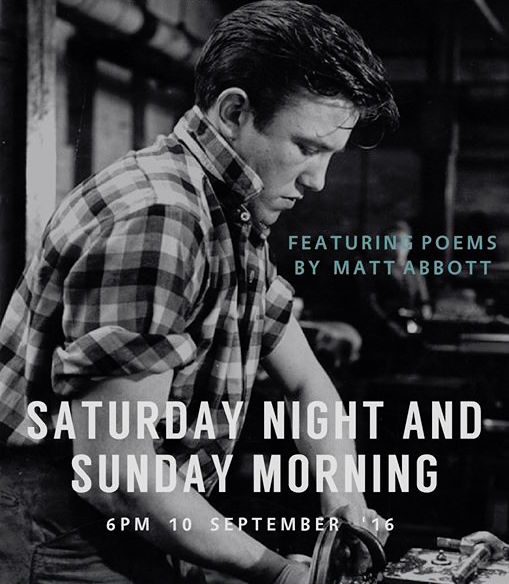The Idle Work Factory and Scalarama present: Saturday Night, Sunday Morning
September 15, 2016

Warm and weighted with anticipation, I sat nestled in the heart of Hyde Park, in the highly regarded Hyde Park Book Club, eagerly awaiting the screening of one of British cinema’s most influential films: Saturday Night, Sunday Morning. Presented by local film company the Idle Work Factory, the evening started with an amazing live poem inspired by the films eponymous hero, written by spoken word artist and Nymphs and Thugs founder Matt Abbott.
The archetype of the kitchen-sink drama and based on Allan Stilltoe’s book of the same name, Saturday Night, Sunday Morning follows the story of a young factory worker Arthur Seaton (Albert Finney) as he navigates domestic working class drudgery, determined not to be drawn into a lifestyle that is not his own choice.
A typical working class rebel, Arthur spends his time in pursuit of the finer things in life—nice clothes, drunken debauchery, and an orchestrated affair with an older married woman—all the while grafting in a factory job he doesn’t like and pursuing the affections of the beautiful Doreen (Shirley Anne Field).
The film itself is a thoroughly engaging and beautiful experience, and it’s portrayal of working class escapism is as heartbreaking at times as it is funny. Albert Finney makes the film. His natural charisma and roguish charm really shines through, especially through the comical clash of idealisms we see the character argue against.
“Whatever people say I am that’s what I’m not.” The influence of both film and book has spanned decades. The Arctic Monkeys took the direct quote and used it as the title for their breakthrough album (an album that heavily referenced working class life in Sheffield). Morrisey used Arthur’s Aunt Ada’s quote—“Them was rotten days”—in the Queen is Dead (1986). And the film itself inspired a generation of filmmakers throughout the 60s and 70s as they moved away from the studios and began to shape what is now known as British New Wave.
With its incredible and rugged cinematography, and the themes explored throughout, it’s easy to forget that it was made nearly 60 years ago. A pillar of modern cinema, it’s as relevant and true to life today as it was back when it was first released in 1960.
As the evening draws to a close the audience was treated to another short impromptu performance by Matt Abbott, whose choice of three poems referenced his own kitchen-sink experiences of growing up in the 90s. Amusing and sweet, Matt engaged heavily with the audience with strong surprising references to the Spice Girls and Girls Aloud. It was a fitting way to end an amazing Indian summers evening, and I thoroughly look forward to seeing more from each of the Idle Work Factory, Matt Abbott, and Nymphs & Thugs.
Filed under: Film, TV & Tech

Comments